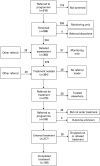Outreach and screening following the 2005 London bombings: usage and outcomes
- PMID: 20178677
- PMCID: PMC2964043
- DOI: 10.1017/S0033291710000206
Outreach and screening following the 2005 London bombings: usage and outcomes
Abstract
Background: Little is known about how to remedy the unmet mental health needs associated with major terrorist attacks, or what outcomes are achievable with evidence-based treatment. This article reports the usage, diagnoses and outcomes associated with the 2-year Trauma Response Programme (TRP) for those affected by the 2005 London bombings.MethodFollowing a systematic and coordinated programme of outreach, the contact details of 910 people were obtained by the TRP. Of these, 596 completed a screening instrument that included the Trauma Screening Questionnaire (TSQ) and items assessing other negative responses. Those scoring ≥6 on the TSQ, or endorsing other negative responses, received a detailed clinical assessment. Individuals judged to need treatment (n=217) received trauma-focused cognitive-behaviour therapy (TF-CBT) or eye movement desensitization and reprocessing (EMDR). Symptom levels were assessed pre- and post-treatment with validated self-report measures of post-traumatic stress disorder (PTSD) and depression, and 66 were followed up at 1 year.
Results: Case finding relied primarily on outreach rather than standard referral pathways such as primary care. The effect sizes achieved for treatment of DSM-IV PTSD exceeded those usually found in randomized controlled trials (RCTs) and gains were well maintained an average of 1 year later.
Conclusions: Outreach with screening, linked to the provision of evidence-based treatment, seems to be a viable method of identifying and meeting mental health needs following a terrorist attack. Given the failure of normal care pathways, it is a potentially important approach that merits further evaluation.
Figures
References
-
- Beck AT, Rush AJ, Shaw BF, Emery G. Cognitive Therapy of Depression. Guilford Press; New York: 1979.
-
- Brewin CR. Cognitive and emotional reactions to traumatic events: implications for short-term intervention. Advances in Mind-Body Medicine. 2001;17:163–168. - PubMed
-
- Brewin CR. Systematic review of screening instruments for the detection of posttraumatic stress disorder in adults. Journal of Traumatic Stress. 2005;18:53–62. - PubMed
-
- Brewin CR, Andrews B, Valentine JD. Meta-analysis of risk factors for posttraumatic stress disorder in trauma-exposed adults. Journal of Consulting and Clinical Psychology. 2000;68:748–766. - PubMed
-
- Brewin CR Fuchkan N Huntley Z 2009Evaluation of the NHS Trauma Response to the London Bombings (MRD 12/98). Final Report to the Department of Health Forensic Mental Health R&D Programme. Department of Health; London
Publication types
MeSH terms
Grants and funding
LinkOut - more resources
Full Text Sources
Medical
Miscellaneous


